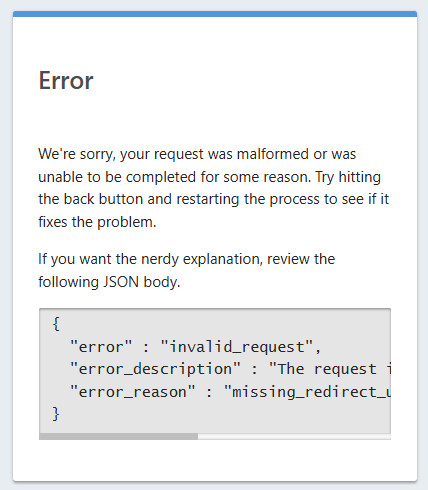Description
I have deployed the application (v. 1.55.1) behind an Apache proxy. I managed to do the intial configuration then I started to fine tune it. Then after I cliecked somewhere I got this error:

Now I'm not able to access anymore, because that error repeats any time I type the address https://auth.easycbam.eu/admin, despite I see that redirect_uri is present. This is the URL I am redirected to by FA:
https://auth.easycbam.eu/oauth2/authorize?client_id=3c219e58-ed0e-4b18-ad48-f4f92793ae32&response_type=code&redirect_uri=%2Fadmin%2Flogin&scope=offline_access&code_challenge=d92fEsDh-9-Y0jTwFoxn4SsF0obQrt--M134Cbw5y5g&code_challenge_method=S256&state=q6eUjG67KDw_Xb5FbyxyDZdx2h5Jsxjve_UU6iYo7As
Here's my Apache configuration, taken from https://github.com/FusionAuth/fusionauth-contrib/blob/main/Reverse Proxy Configurations/apache/apache.ssl.conf then edited with values from my installation:
# Change the following:
# bbdb8f55-65e7-4de7-a5ff-f08df4ea8005 -> to the client_id of your application
# 9f144ac0-3006-e653-2ce1-ba98bb40f3eb -> to the tenant ID of your tenant
# http://localhost:9011/ -> to the location of your FusionAuth service
# auth.easycbam.eu -> to the domain of your FusionAuth server
# /usr/local/fusionauth/fusionauth-app/web -> to the path to your FA static content
# Optional: If you want to serve static files directly without FusionAuth
#<Directory "/usr/local/fusionauth/fusionauth-app/web/">
# Require all granted
# allow from all
# AllowOverride none
#</Directory>
# Redirect all traffic to SSL, except LE challenges
<VirtualHost *:80>
ServerName auth.easycbam.eu
Redirect permanent / https://auth.easycbam.eu/
RewriteEngine on
RewriteCond %{SERVER_NAME} =auth.easycbam.eu
RewriteRule ^ https://%{SERVER_NAME}%{REQUEST_URI} [END,NE,R=permanent]
# Optional: If you want to use LetsEncrypt keep this, otherwise remove it
#Alias /.well-known /var/www/letsencrypt/.well-known
</VirtualHost>
<VirtualHost *:443>
ServerAdmin daniele.bonfatti@ket-consulting.com
ServerName auth.easycbam.eu
# Optional: This avoids proxying local files which Apache can serve without
# bother FusionAuth. There may be reasons to let FA deal with these files, in which
# case these should be removed.
#Alias /js /usr/local/fusionauth/fusionauth-app/web/js
#Alias /css /usr/local/fusionauth/fusionauth-app/web/css
#Alias /images /usr/local/fusionauth/fusionauth-app/web/images
RewriteEngine on
# Optional (here for security reasons)
#RewriteCond %{REQUEST_METHOD} ^(TRACE|TRACK)
#RewriteRule .* - [F]
# Users logging into the auth URL will end up at /login?code=...&userState=Authenticated
# and will receive a 500 error from FusionAuth. This redirect sends them off to the application
# to do whatever it was they wanted to do at the auth URL.
RewriteCond %{REQUEST_METHOD} =GET
RewriteCond %{QUERY_STRING} (^|&)userState=Authenticated($|&)
RewriteRule /login https://www.easycbam.eu/app? [R,L] # Set to the URL of your application
# This rewrite corrects the client_id in proxied requests. It only does so if there was one
# to start with, and it's not clever enough to realise it's already corrected it
RewriteCond %{REQUEST_METHOD} =GET
RewriteCond %{QUERY_STRING} ^(.*)client_id=([^&]*)($|&)(.*)$
RewriteRule ^(.*)$ $1?%1client_id=bbdb8f55-65e7-4de7-a5ff-f08df4ea8005 [E=rewritten:1]
# This corrects a tennantID if there's one set already. This prevents users for fiddling with it
# (or rather, users can write what they want in a URL, this ensures we only send the correct one
# to FusionAuth)
RewriteCond %{REQUEST_METHOD} =GET
RewriteCond %{QUERY_STRING} ^(.*)tenantId=([^&]*)($|&)(.*)$
RewriteRule ^(.*)$ $1?%1tenantId=9f144ac0-3006-e653-2ce1-ba98bb40f3eb [E=rewritten:1]
# This adds a tenantID if there isn't one already. It only does this if there is something in
# the query string though. This avoids adding one to static content and the like.
RewriteCond %{REQUEST_METHOD} =GET
RewriteCond %{QUERY_STRING} !^$
RewriteCond %{QUERY_STRING} !tenantId=
RewriteRule ^(.*)$ $1?%{QUERY_STRING}&tenantId=9f144ac0-3006-e653-2ce1-ba98bb40f3eb [E=rewritten:1]
# Finally, this "noop" tells Apache to treat the rewritten URL as a URI and to re-run it through
# the checks for proxies etc, otherwise it'll be treated as a local file (which will fail)
RewriteCond "%{ENV:rewritten}" "=1"
RewriteRule ^(.*)$ $1 [PT]
# Optional: if you're using LE then keep this, otherwise remove it
#Alias /.well-known /var/www/letsencrypt/.well-known
# These X- headers are required - without them CSRF won't work
RequestHeader set X-Real-IP "%{REMOTE_ADDR}s"
RequestHeader set X-Forwarded-Proto "https"
RequestHeader set X-Forwarded-Port "443"
RequestHeader set X-Forwarded-For "%{REMOTE_ADDR}s"
# This header is useful for API calls that don't have query strings (and so will miss the rules above)
RequestHeader set X-FusionAuth-TenantId 9f144ac0-3006-e653-2ce1-ba98bb40f3eb
ProxyPass / http://localhost:9011/
ProxyPassReverse / http://localhost:9011/
# We have to send a "Host: xxx" header with the orginal server hostname in it
ProxyPreserveHost On
<Location />
# This stops Apache sending X-Forwarded-Host and X-Forwarded-Server, which seem to trip up FusionAuth
# It also stops X-Forwarded-For, which we need, but set that ourselves above. This also has to go
# inside a <Location> otherwise it doesn't work.
ProxyAddHeaders off
</Location>
SSLCertificateFile /etc/letsencrypt/live/auth.easycbam.eu/fullchain.pem
SSLCertificateKeyFile /etc/letsencrypt/live/auth.easycbam.eu/privkey.pem
Include /etc/letsencrypt/options-ssl-apache.conf
</VirtualHost>
Any idea on how to solve it?
